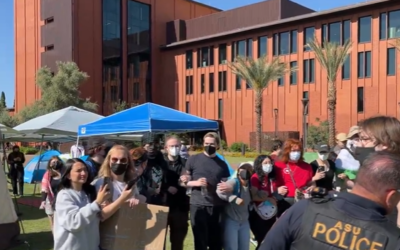By Corinne Murdock |
Arizona Secretary of State Adrian Fontes is facing another lawsuit over his Elections Procedures Manual (EPM), the state’s rulebook for administering federal and state elections updated biennially.
On Friday, the Arizona Republican Party (AZGOP), the Republican National Committee (RNC), and Yavapai County GOP sued Fontes over the 2023 EPM. Newly-elected AZGOP Chairwoman Gina Swoboda stated in a press release that Fontes had far surpassed his limited rulemaking authority through the EPM.
“Fontes and his allies are not legislators — they have no right to insert their preferred far-left policies into the guidance for Arizona elections,” said Swoboda. “This is a blatant attempt to rewrite election law and hollow out basic safeguards that are designed to preserve election integrity in our state’s elections.”
State law limits Fontes’ rulemaking authority to supporting existing laws on early and regular voting, and the handling of ballots and other election materials. The GOP groups stated in their lawsuit that these limitations were necessarily “specific and exhaustive” because the EPM carries the force of law upon approval by the governor and attorney general: a violation of any EPM provision is a class two misdemeanor, which carries a maximum four-month jail sentence.
Nine provisions set forth in Fontes’ EPM conflict with state election law, according to the GOP groups. These provisions concern registered voters who are declared noncitizens or have not provided Documentary Proof Of Citizenship (DPOC), signature verification, challenges to early ballots, out-of-state mailed ballots, and out-of-precinct voters.
One contested EPM provision requires county recorders to not cancel the voter registrations of individuals who declared themselves noncitizens on juror questionnaires if they have previously provided DPOC or have been registered to vote since 2004. The GOP groups contend that A.R.S. § 16-165(A)(10) requires county recorders to cancel those types of voter registrations, should the individual in question not respond to a mailed request for DPOC within 35 days.
A second contested EPM provision allows for those who don’t submit DPOC or whose DPOC can’t be verified to be registered as federal-only voters: individuals who may only cast votes for federal offices. The GOP groups contend that A.R.S. § 16-127(1) prohibits those without DPOC from voting in presidential elections.
A third contested EPM provision allows first-time, federal-only voters to provide only an ID and not DPOC in order to vote by mail. The GOP groups contend that A.R.S. § 16-127(2) prohibits anyone who hasn’t provided DPOC from voting by mail.
Fourth and fifth contested EPM provisions declare that county recorders aren’t required to check federal databases for citizenship review purposes. The GOP groups contend that A.R.S. §§ 16-165 and 161-121.01 require county recorders to compare voter registrations to a specific and inclusive list of state and national databases.
A sixth contested EPM provision precludes public review of voter signatures on mail ballots, limiting review to documents pertaining to a candidate, initiative, referendum, recall, new party, or petition. The GOP groups contend that A.R.S. § 16-168(F) allows public review of voter signatures for all election purposes.
A seventh contested EPM provision allows Active Early Voting List (AEVL) voters to make one-time requests for their ballots to be mailed to an address outside the state for certain elections. The GOP groups contend that A.R.S. § 16-544(B) prohibits AEVL voters from using a mailing address outside the state unless they are Uniformed and Overseas Citizens Absentee Voting Act (UOCAVA) voters.
An eighth contested EPM provision requires the denial of early ballot challenges received prior to the “return” of an early ballot or after the opening of an early ballot affidavit envelope. The GOP groups contend that A.R.S. § 16-552(D) allows for challenges to be placed before early ballots are placed in the ballot box specifically.
A ninth contested EPM provision allows out-of-precinct voters to cast provisional ballots. The GOP groups contend that A.R.S. § 16-122 prohibits out-of-precinct voters from voting at all.
Their lawsuit also accuses Fontes of ignoring statutory requirements for public and stakeholder review of the EPM, namely by withholding disclosure of “critical portions” of the rulebook until its final release last December.
GOP leadership also objected to Fontes only granting 15 days for initial public comment on the draft EPM from last July to mid-August and then allowed for no public comment period prior to the publishing of the final EPM in December. The Administrative Procedure Act (APA) requires agencies — defined as boards, commissions, departments, officers, or other administrative units — to allow for at least 30 days of public comment. The GOP groups argue that the secretary of state’s office falls under APA’s definition of agency.
Both the AZGOP and RNC raised objections to the brevity of public comment for the draft EPM around the time of its release, which Fontes ignored.
At the end of last month, Arizona’s GOP legislative leadership sued Fontes over the EPM. Their lawsuit contested some of the same provisions as this latest lawsuit from the GOP groups, but also contested other provisions, such as an AEVL provision delaying voter roll cleanup until 2027 and a canvassing provision circumventing court-based relief for when boards of supervisors fail to certify an election.
Corinne Murdock is a reporter for AZ Free News. Follow her latest on Twitter, or email tips to corinne@azfreenews.com.








